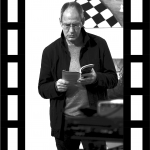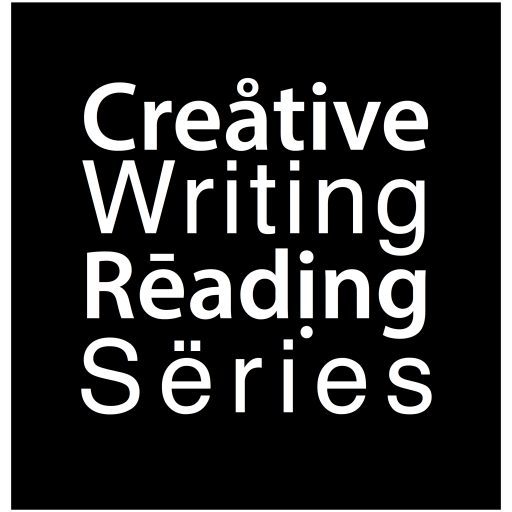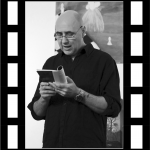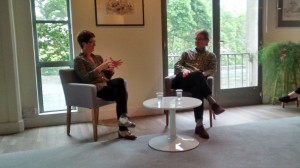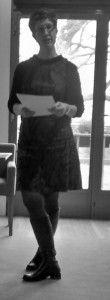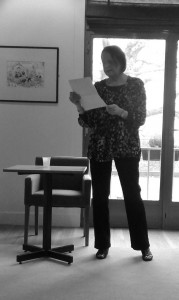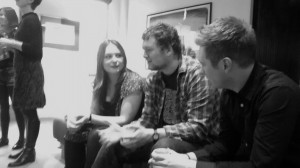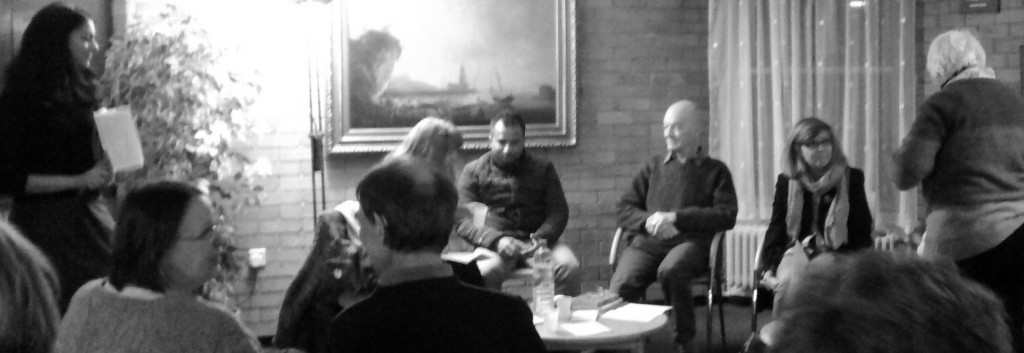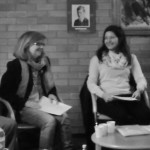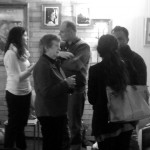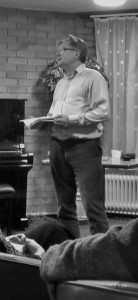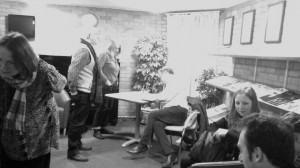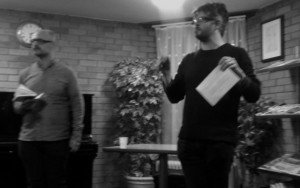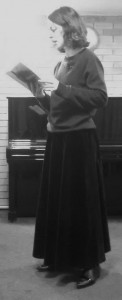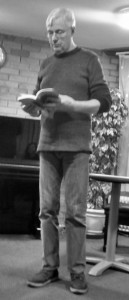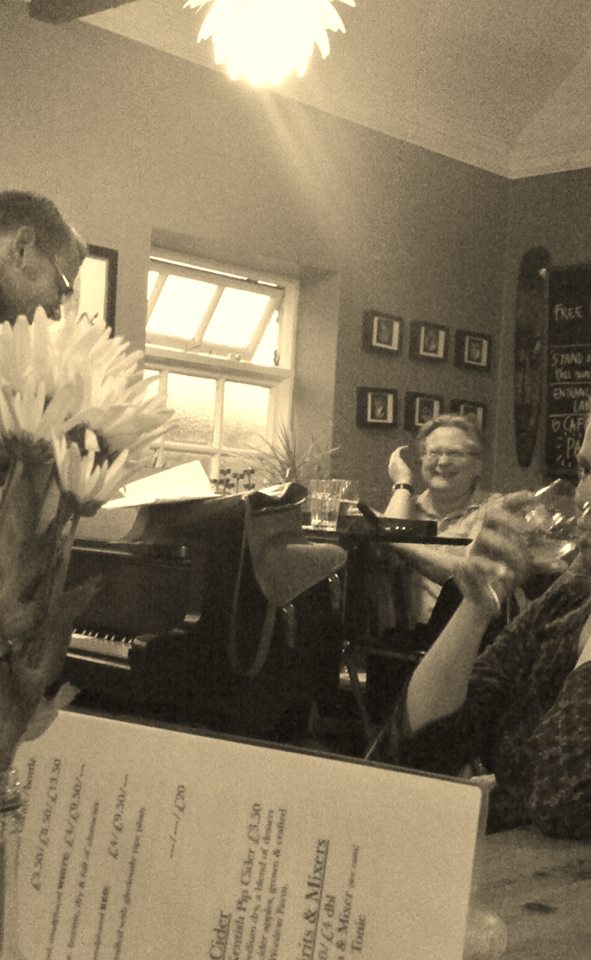We like to ensure that Kent writing students don’t get too comfortable sitting at their desks. Sometimes they need to take a pair of scissors to their text. Sometimes they get to finish each other’s sentences. Sometimes we make them walk around in the rain.
Reading Week can mean a lot of silent cramming: reading, essay deadlines, project planning. So in the run-up, it’s good to stretch the legs a little and make some noise.
Here’s how my undergrad seminar group coped when we took a circuitous stroll to the campus labyrinth.
9.30am: Rain check. The slopes of Eliot footpath muddy but passable. The labyrinth lightly littered with sticks. Walking and kicking them aside attracts the attention of a muddy-footed terrier, two excitable children and two women in wellies and macs. One is, I realise, a local poet. We talk about the labyrinth as a place to escape, think, write. The children jump, hop, skip to the centre. The sky is clear. The dog dances with twigs.
10.00am: The rain starts.
11.00am: Seminar on postmodernity and the novel. We negotiate a path through the texts of Lyotard, Jameson and Baudrillard. We talk about smashing through the Spectacle, consider conspiracy theories, the reflective surfaces of White Noise and the fragmented maze of meaning in Pynchon’s prose.
12 noon: Workshop. Students present their ideas for writing manifestoes. What should writing do? There are rants, metaphors and playful typography. The drizzle continues. I propose the labyrinth. Several students whinny nervously.
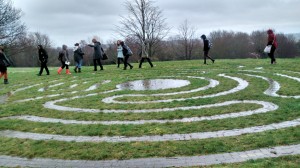
labyrinth walk
1.30pm: The labyrinth. (Light) rain. I offer encouragement: this is a place for emptying the head, focussing ideas. It’s not a race, I say. Think Sebald, I tell them. Think Borges. The students jump, hop, skip and slide to the centre. Some mime a minotaur. They clutch damp notebooks. One of them actually writes things down.
2.00pm: Rain stops. The students squelch away, some smiling. Some grumbling. Maybe, just maybe, they will remember this.
Using the labyrinth for creative writing: three ways in
1) The nugget. Before you walk, focus on one nugget to write about. Maybe you want to brainstorm a setting or character, or you are into a text and a question needs answering. Walk into the centre, thinking about your nugget. When you arrive, stop, get out your notebook, write your ideas down. Walk back out the way you came: your notes will echo in your head. Sit down when you return to the beginning: keep writing. It’s miraculous, but it works.
2) The hiatus. Take a piece of text – a short passage of prose or poetry – and read the text to yourself as you walk. Whenever the path changes direction, stop and mark that point in the text. When you have finished the walk, use those marks to rework your text. Turn them into line breaks, or end points for cut-ups. Make them peaks and troughs. Let the labyrinth reshape predictable sentence constructions.
3) The stream. Freewrite as you walk. Avoid all punctuation. Stop when you get to the centre. Walk back again, reading the text to yourself. Use twists and coils in the path as moments to pause, punctuate and edit.
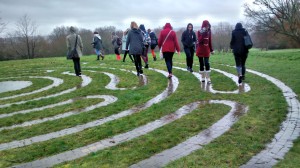
Poets on the new undergraduate Innovative and Avant Garde Poetries module got to grips with sound and concrete poems this week. Here’s a glimpse of what they’ve been up to.
Do try this at home (though you may want to wait until the house is empty)
1) Take a poem or piece of text. Choose one sentence that sticks out for you. What happens when you break that sentence down into its component sounds? What happens when you rearrange those sounds? What happens when you repeat some of them, or omit some of them? Write / compose a poem making use of these sounds.
2) Choose just one letter of the alphabet and write down, for three minutes, a list of words that explicitly incorporate that word in all its phonetic guises (eg. for C, cat, cheetah, ceiling, chaise-longue etc). What happens when you break these words down into their component parts? Compose a poem that seeks to explore that letter of the alphabet in all its sonic possibilities.
3) Sound and Performance Poetry Warm Up – begin to create a performance poem:
– Using the recording device on a laptop, phone or other piece of equipment, make a recording of one of your shortest poems or a verse of a poem that you have written.
– Read it a second time into the microphone in one of the following ways: shouting, whispering with your eyes open or closed, singing. Try to ‘lose yourself’ in this process. (Improvise on your original poem at this point if you wish to).
– Select one word from your poem and reproduce its individual component parts – vowels and consonants; stretched, percussively or other. Experiment with the pace or musical tempo of your delivery by doing this either in slow motion or in very rapidly repeating sounds.
– Aim for a recording length between 30 seconds and 3 minutes.
– Email the resultant sound clip to yourself or to a friend. Errors are fine and there is no need to re-do the entire clip unless you wish to. Feel free to add any additional sounds that you feel contribute to your poem or to the experience of performing and hearing it.
For now, heads down and get those essays finished. But when the deadlines are over, get moving. Take your notebook out walking. Take it to dinner. At least buy it coffee somewhere: it will pay you back.
Don’t forget the next evening of the Spring Reading Series: Janice Pariat, Keynes SCR, Wednesday 5th March, 6pm.
Happy writing.
Sonia
Many thanks to the students of my EN679 seminar group for being (reasonably) game, and to Nell Perry and Amy Evans for their inspiring poetry exercises.

